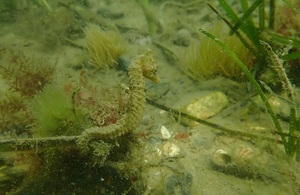Seaford to Eastbourne Nature Recovery Project launches
Seaford to Eastbourne Nature Recovery Project will create wildlife-rich habitats, improve climate security, and offer opportunities for the local communities

Juvenile short-snouted seahorse - Hippocampus hippocampus Photo credit: Lucy May
An area bigger than the size of Hertfordshire is to be dedicated to fast tracking nature recovery, as six new landscape-scale Nature Recovery Projects are launched by Natural England and the government.
One of these Nature Recovery Projects covers the area from Seaford to Eastbourne in East Sussex. This is an ambitious project and takes in around 12,000 ha of the iconic landscape and seascape of the Sussex Heritage Coast and hinterland. The location is at the eastern end of the South Downs National Park, across two chalk aquifers, the meandering Cuckmere River – the only undeveloped river mouth in Sussex, and over to the spectacular Seven Sisters chalk cliffs and chalk reefs of Beachy Head Marine Conservation Zones.
The project was originally inspired by studies of the chalk aquifers in the area, that demonstrated the importance of healthy chalk grass and chalk heath habitats to maximise deep soil moisture and water infiltration. Improving nature across the wider area will help ensure the nearby towns of Seaford and Eastbourne continue to receive clean, plentiful, and sustainable water.
It will reinforce nature and natural processes across this varied landscape as the key provider of clean and plentiful drinking water, local food, and positive nature connections for people in the growing towns of Seaford and Eastbourne, and the many visitors that come to the area each year.
Jim Seymour, Sussex Kent area manager for Natural England, said:
We’re excited to launch this Nature Recovery Project here in East Sussex focussing on how nature can improve life’s most vital needs. These include clean water, nutritious food, space for physical and mental wellbeing and a more resilient environment to call home.
It’s a fantastic opportunity to continue our work with all the great partners and partnerships in the area to deliver on our joint ambitions for people and nature.
Emma Goddard, head of environment at South East Water, said:
South East Water is pleased to partner on this exciting Nature Recovery Project. We have been working with Natural England and other partners for a long time to understand and promote the benefits that thriving nature has on the quality and quantity of our customers’ drinking water.
We’re excited by the prospect of restoring more nature across the area, particularly with the potential extension to Lullington Heath National Nature Reserve.
A key part of the project will be the ambitious plan to extend the National Nature Reserve (NNR) at Lullington Heath in the heart of the area, as part of the King’s Series of National Nature Reserves. This super NNR will bring a collaborative approach to managing at a landscape-scale around the existing reserve to enhance nature for generations to come.
There will also be a focus on creating and restoring a mosaic of habitats across this varied landscape, from the wildflower chalk grasslands, the meandering Cuckmere River, and the wooded slopes of Friston and Eastbourne Escarpment, linking in with the wider farmed landscape, essential for our food security.
These habitats will play an essential role in mitigating and adapting to the effects of climate change, creating natural flood management schemes over time as well as being the basis for species recovery too. Focussing initially on the rare wart-biter cricket, found in only 6 sites across Britain, and the short-snouted seahorse, a protected Seahorse species found in the Marine Conservation Zones just off Beachy Head, the project will work with partners to boost populations of these rare species.
Connecting people with nature and joining up visitor experiences that offer sustainable travel while also providing support for mental health initiatives in the area, will provide an emphasis on people and the local community.
The six multi-partnership collaborative projects covering 176,000 hectares of land across England – from the Tees Estuary to the South Downs – will create improved and better-connected habitats for wildlife and improve public access to nature. The projects will strengthen the national Nature Recovery Network and showcase delivering nature recovery at scale.
The projects, announced today (20 July), will help to address biodiversity loss, climate change and public health. This includes managing flooding and wildfire risks, improving carbon stores and growing diverse habitats for wildlife such as the endangered wart-biter cricket and the elusive twite.